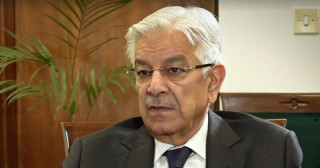Syed Haider Imam
Chief Minister (5k+ posts)
DEC 09 2015










[h=1]Over 30,000 govt schools to be provided with facilities[/h] KOHAT: Provincial Minister for Elementary and Secondary Education Department Mohammad Atif Khan has announced that over 30,000 government schools in Khyber Pakhtunkhwa will be provided basic facilities through the parent-teacher councils (PTCs).
Addressing a function here on Tuesday, the minister said that for this purpose Rs43 billion had been earmarked, while Rs10 billion had already been released. These institutions would be provided with computer labs, classrooms, water, latrines and other facilities.
He said that under the government policy of implementing equal education system and making the government schools and colleges educationally attractive, many IT companies had been contacted to install attendance system both for the students and teachers in all the schools.
[h=4]Minister says Rs43bn to be spent through parent-teacher councils[/h]
Managing director of the Elementary Education Foundation, Allah Nawaz Soomro, was also present on the occasion. He said that importance would be given to enforce same dress code in schools throughout the province so that the children should not feel marginalised.
He said that without competent teachers the schools and colleges could not excel despite all facilities. He said that attention was being paid to hiring highly-qualified staff on good salaries.
290 SUSPECTS HELD: The district police launched a grand operation against the criminals, their hideouts and facilitators and arrested 290 suspects, including a proclaimed offender, on Tuesday.
Bomb disposal squads, elite force, APCs, sniffer dogs, lady police and vehicles mounted with heavy machine guns have been moved from the city to the areas which have borders with Attock and Mianwali areas of Punjab.
The action was launched in line with the National Action Plan to ensure safety of citizens, said a statement issued from the office of DPO Sohaib Ashraf.
Two operational teams each headed by SHO Lachi Razi Gul and SHO Shakardarra Nazir Hussain have been formed to purge the remote areas from criminals where normal police manoeuvers could not be taken on routine basis.
During the action in Wali and Mandoori areas the Lachi police arrested a fugitive, identified as Spin Gul, and seized illegal weapons from his possession. He was wanted in murder and attempted murder cases.
The Lachi police also checked 120 houses, nine hotels and eight bus stands and booked 23 people. Besides, 485 motorcyclists were fined for not having registration documents and 84 drivers for tinted glasses of their cars.
The statement said that the operation along the tribal belt remained effective in stopping shifting of stolen vehicles, drugs and weapons and a permanent checkpost had been established there.
It claimed that as a result of this operation the northern, western and north-western sides of Kohat bordering tribal areas had been secured.
Published in Dawn, December 9th, 2015
http://www.dawn.com/news/1225178/over-30000-govt-schools-to-be-provided-with-facilities










[h=1]Over 30,000 govt schools to be provided with facilities[/h] KOHAT: Provincial Minister for Elementary and Secondary Education Department Mohammad Atif Khan has announced that over 30,000 government schools in Khyber Pakhtunkhwa will be provided basic facilities through the parent-teacher councils (PTCs).
Addressing a function here on Tuesday, the minister said that for this purpose Rs43 billion had been earmarked, while Rs10 billion had already been released. These institutions would be provided with computer labs, classrooms, water, latrines and other facilities.
He said that under the government policy of implementing equal education system and making the government schools and colleges educationally attractive, many IT companies had been contacted to install attendance system both for the students and teachers in all the schools.
[h=4]Minister says Rs43bn to be spent through parent-teacher councils[/h]
Managing director of the Elementary Education Foundation, Allah Nawaz Soomro, was also present on the occasion. He said that importance would be given to enforce same dress code in schools throughout the province so that the children should not feel marginalised.
He said that without competent teachers the schools and colleges could not excel despite all facilities. He said that attention was being paid to hiring highly-qualified staff on good salaries.
290 SUSPECTS HELD: The district police launched a grand operation against the criminals, their hideouts and facilitators and arrested 290 suspects, including a proclaimed offender, on Tuesday.
Bomb disposal squads, elite force, APCs, sniffer dogs, lady police and vehicles mounted with heavy machine guns have been moved from the city to the areas which have borders with Attock and Mianwali areas of Punjab.
The action was launched in line with the National Action Plan to ensure safety of citizens, said a statement issued from the office of DPO Sohaib Ashraf.
Two operational teams each headed by SHO Lachi Razi Gul and SHO Shakardarra Nazir Hussain have been formed to purge the remote areas from criminals where normal police manoeuvers could not be taken on routine basis.
During the action in Wali and Mandoori areas the Lachi police arrested a fugitive, identified as Spin Gul, and seized illegal weapons from his possession. He was wanted in murder and attempted murder cases.
The Lachi police also checked 120 houses, nine hotels and eight bus stands and booked 23 people. Besides, 485 motorcyclists were fined for not having registration documents and 84 drivers for tinted glasses of their cars.
The statement said that the operation along the tribal belt remained effective in stopping shifting of stolen vehicles, drugs and weapons and a permanent checkpost had been established there.
It claimed that as a result of this operation the northern, western and north-western sides of Kohat bordering tribal areas had been secured.
Published in Dawn, December 9th, 2015
http://www.dawn.com/news/1225178/over-30000-govt-schools-to-be-provided-with-facilities
Last edited:













































































































